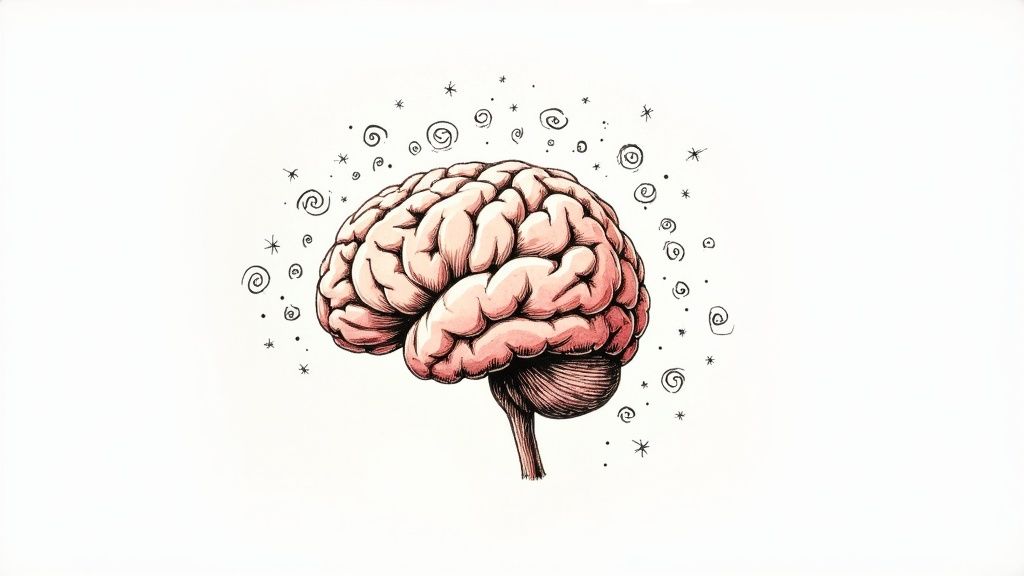Understanding the Science of Stress Reduction

An overwhelming amount of scientific evidence proves that mindfulness meditation reduces stress in measurable ways. This is not surprising to long-time practitioners, who already experience the calming effects of a regular meditation practice. Understanding the biological mechanisms behind this process helps explain why such a simple practice can have such far-reaching effects on our wellbeing.
How Mindfulness Meditation Impacts the Stress Response
When you encounter a stressful situation, your body activates its "fight-or-flight" response, flooding your system with hormones like cortisol and adrenaline. While this response evolved to protect us from danger, living with constant stress keeps these hormone levels high, which can harm both physical and mental health over time. This is where mindfulness meditation steps in. By bringing your attention to the present moment and your breath, you naturally interrupt the cycle of anxious thoughts that trigger stress hormones. For instance, taking several mindful breaths during a tense meeting can help your body shift out of fight-or-flight mode and back to a more balanced state.
The Neuroscience of Change
Beyond immediate stress relief, regular mindfulness meditation creates lasting changes in the brain. Research shows that people who meditate regularly develop more grey matter in key brain regions. The hippocampus, which helps with learning and memory, becomes denser. The prefrontal cortex, responsible for decision-making and emotional control, also grows stronger. At the same time, activity decreases in the amygdala – the brain's fear and stress center. In other words, each meditation session helps build a brain that's better equipped to handle stress and maintain emotional balance.
Practical Applications for Stress Management
This knowledge lets us use mindfulness meditation more effectively in daily life. While establishing a long-term practice brings the biggest benefits, even short sessions can help in the moment. Taking five minutes to meditate before a job interview or important presentation can help calm nerves and sharpen focus. Making meditation a daily habit, like brushing your teeth, gives you reliable tools for staying steady when life gets rocky.
The stress-busting power of mindfulness leads naturally into its broader effects on mental performance, which we'll explore next.
Boosting Brain Power Through Mindful Practice

When we practice mindfulness meditation regularly, we don't just feel more relaxed – we actually change how our brains function. Research shows that consistent meditation practice helps develop stronger cognitive abilities, from better memory to deeper concentration. Many people who meditate often find they can think more clearly, remember details more easily, and come up with fresh ideas. Let's explore exactly how mindfulness meditation enables these mental improvements.
Sharpening Focus and Attention
The simple act of returning attention to your breath during meditation is like exercise for your mind. Each time you notice your thoughts wandering and gently bring focus back to breathing, you strengthen the brain networks that control attention. Just as lifting weights builds muscle, this mental training makes it easier to concentrate and avoid distractions in daily life. Studies back this up – even brief meditation programs of just four days can measurably improve attention span. This enhanced focus helps in everything from completing work tasks to making thoughtful decisions.
Enhancing Memory and Learning
Meditation also supports better memory and learning by promoting healthy brain changes. The practice increases the brain's plasticity – its ability to form new neural connections, especially in the hippocampus region crucial for memory formation. A study found that 53% of students who meditated noticed improvements in their ability to remember information and concentrate. By reducing mental stress and anxiety, meditation creates ideal conditions for absorbing and retaining new knowledge. The calm, focused state allows the brain to process information more effectively.
Fostering Creativity and Problem-Solving
Beyond strengthening attention and memory, mindfulness meditation opens up mental space for creative insights. By quieting the constant stream of thoughts, meditation helps us notice new perspectives and possibilities we might otherwise miss. It's like decluttering a room – once you clear away the mental noise, you can see things from fresh angles. This clarity of mind proves especially valuable when tackling complex challenges, whether in work projects, artistic pursuits, or everyday problem-solving. Regular meditation practice helps unlock our natural capacity for innovative thinking by training both focused attention and mental flexibility.
Transforming Physical Health Through Meditation

The benefits of mindfulness meditation extend far beyond mental clarity – research shows it creates measurable changes in our physical health. From easing chronic pain to supporting heart health, regular meditation practice can improve multiple aspects of our wellbeing. Let's explore the specific ways mindfulness meditation affects our bodies and overall health.
The Impact of Mindfulness Meditation on Pain Management
For the millions who deal with chronic pain, mindfulness meditation offers a natural approach to finding relief. Rather than trying to eliminate pain completely, meditation helps us develop a different relationship with physical discomfort. By learning to observe pain sensations with curiosity instead of resistance, we can reduce the emotional suffering that often makes pain feel worse. For example, during a flare-up, focusing on calm breathing provides an anchor of stability rather than getting caught in a spiral of anxiety. This mental shift helps many people feel more in control of their pain experience. You might be interested in: The 5 Ways Meditation Can Improve Your Health.
Improving Sleep Quality Through Meditation
Poor sleep affects countless people, draining both physical and mental energy. Mindfulness meditation naturally promotes better rest by helping quiet an overactive mind at bedtime. Simple practices like doing a relaxing body scan meditation create the right conditions for deep sleep. People who meditate regularly often fall asleep more easily, wake up less during the night, and feel more refreshed in the morning. The cumulative effects of better sleep through meditation ripple out to improve overall health and daily functioning.
Strengthening the Immune System
Scientists have found interesting connections between mindfulness practice and improved immune function. Research shows that people who meditate regularly tend to have lower inflammation levels and better resistance to illness. This likely stems from meditation's ability to reduce stress, since ongoing stress is known to weaken immune defenses. Additionally, certain types of meditation that focus on cultivating positive emotions like compassion may give an extra boost to immune system activity.
Cardiovascular Health and Mindfulness
The heart-healthy effects of meditation are well-documented through research. Regular practice helps lower blood pressure and reduce risk factors for heart disease. Since stress plays a major role in cardiovascular problems, meditation's calming influence shows up in concrete ways – from slower heart rate to improved blood flow. Much like exercise benefits the heart, consistent mindfulness practice supports long-term cardiovascular health. Taking time to meditate gives us an active role in protecting our heart health through simple daily habits.
Mastering Workplace Performance With Mindfulness
While many of us focus on external tools and strategies to boost our work performance, mindfulness meditation offers a powerful internal approach that can improve focus, reduce stress, and strengthen team dynamics. The demanding nature of modern work life can take a toll on our mental clarity and emotional balance. That's why more professionals are turning to mindfulness practices to stay sharp and composed.
Enhancing Focus and Productivity
When you practice mindfulness meditation regularly, you develop a stronger ability to stay present and focused on the task at hand. This skill proves invaluable in a world full of notifications, interruptions, and competing priorities. Taking even a brief pause to meditate before diving into complex work can make a real difference. For instance, many professionals find that a 5-minute mindfulness session helps them maintain deeper concentration during challenging projects and make fewer mistakes.
Managing Workplace Stress and Emotional Regulation
Work stress affects nearly everyone, often hurting both individual performance and team morale. Mindfulness meditation gives you practical tools to handle pressure more effectively. As you learn to observe your thoughts and feelings without getting caught up in them, you develop better emotional balance. This means staying level-headed during tight deadlines or difficult conversations. Research backs this up – one study showed that just 10 days of guided meditation reduced stress by 14% and irritability by 27%.
Improving Communication and Team Dynamics
The benefits of mindfulness naturally extend to how we interact with colleagues. When you practice mindful communication – truly listening and speaking with awareness – you build stronger working relationships. Team members who practice mindfulness often report better collaboration and fewer misunderstandings. This ripples outward, creating a more positive environment where people feel heard and supported.
Practical Applications in the Workplace
You don't need to make dramatic changes to bring mindfulness into your workday. Simple practices can create meaningful shifts:
- Short Meditation Breaks: Take 5-minute meditation breaks at your desk between tasks to reset your focus
- Mindful Meetings: Begin meetings with a minute of silence to help everyone arrive mentally and engage more fully
- Walking Meditation: Use lunch breaks for mindful walks, paying attention to each step and your surroundings
- Mindful Communication: Practice active listening in conversations, focusing on understanding rather than just responding
By incorporating these straightforward practices into your routine, you can start experiencing the real benefits of mindfulness at work. Small, consistent steps often lead to the most sustainable positive changes in how we work and interact with others.
Elevating Academic Success Through Meditation

Meditation provides students with mental clarity and physical well-being that directly support academic achievement. The daily reality for students includes intense coursework, high-stakes exams, complex social dynamics, and uncertainty about future careers. By practicing mindfulness meditation regularly, students can better handle these challenges while improving their ability to learn and retain information.
Sharpening Focus for Effective Studying
Students need strong concentration skills to understand complex topics and remember what they learn. Mindfulness meditation helps build this ability by training the mind to stay present and engaged. Just like athletes warm up before competing, taking five minutes to meditate before studying helps clear the mind and create ideal conditions for learning. Students who practice this technique often find they can study longer and understand material more deeply on the first read-through.
Enhancing Memory Retention and Recall
Regular meditation practice strengthens the brain's ability to form and access memories. This happens because meditation positively affects the hippocampus, the brain region responsible for memory formation. Students who meditate consistently tend to perform better on tests and assignments since they can more easily remember and work with complex information across multiple subjects. Research has shown direct links between meditation practice and improved memory capacity.
Managing Academic Stress and Anxiety
The drive to excel academically often creates stress that can actually block learning and hurt test performance. Mindfulness meditation gives students practical tools to handle these emotional challenges. By practicing non-judgmental awareness of their thoughts and feelings, students build emotional stability that helps them stay calm during high-pressure situations like exams and presentations. Research supports this – one study found that students who meditated had much less test anxiety and scored higher on exams as a result.
Practical Integration into Student Life
Students can gain the benefits of mindfulness meditation without major schedule changes. Quick meditation breaks between classes or study sessions can make a real difference. Even pausing for a few focused breaths before an exam helps calm nerves and improve focus. Students can also practice mindfulness during daily activities like walking across campus or eating meals. By bringing awareness to these everyday moments, they strengthen their meditation skills while enhancing both their grades and overall well-being.
Building Your Personal Meditation Practice
Starting a mindfulness meditation practice is like learning any other skill – it takes guidance, practice, and patience to develop. By following some key principles and practical steps, you can create a meditation routine that fits naturally into your life and provides lasting benefits.
Choosing the Right Meditation Style
Finding a meditation approach that feels natural and engaging makes all the difference in building a sustainable practice. Here are some proven techniques to explore:
-
Mindful Breathing: This simple but powerful practice involves observing your natural breath without trying to change it. When your mind wanders (which is totally normal), you gently bring your attention back to the breath. For beginners, this offers an accessible entry point.
-
Body Scan Meditation: Moving your awareness systematically through your body helps develop a deeper mind-body connection. You'll notice physical sensations without judgment – from areas of tension to feelings of ease. Many find this especially helpful for reducing stress.
-
Walking Meditation: For those who prefer movement, this practice brings mindful attention to each step – feeling your feet touching the ground, noting the shifting of weight, and coordinating breath with motion. It's perfect when sitting feels too challenging.
-
Loving-Kindness Meditation: This heart-centered practice cultivates care and goodwill, starting with yourself and gradually expanding to others. By developing genuine warmth and compassion, it can shift difficult emotional patterns.
Take time to sample different approaches and notice which ones resonate most deeply. There's no single "right way" – the key is finding what works for you.
Creating a Sustainable Routine
Like physical exercise, meditation yields the most benefit through regular practice. Start with just 5-10 minutes daily and build from there as it becomes more comfortable. Here are practical tips for establishing a lasting routine:
-
Set a Specific Time: Pick a consistent time that fits your schedule, whether that's first thing in the morning, during lunch, or before bed. Having a set time helps make it a natural part of your day.
-
Create a Dedicated Space: Find a quiet spot where you can practice without interruption. Keep it simple – just a cushion or chair in a peaceful corner works well.
-
Use Technology Mindfully: Quality meditation apps and audio guides can provide helpful structure as you're learning. They offer clear instructions and reminders to practice.
-
Track Your Progress: Keep brief notes about your practice – even just marking the days you meditate. This builds momentum and helps you notice patterns.
-
Be Patient and Kind to Yourself: Your mind will wander and some days will feel harder than others. That's completely normal. Simply notice when this happens and gently return to your practice.
Deepening Your Practice Over Time
As meditation becomes more familiar, you can explore ways to expand your practice:
-
Silent Meditation: Gradually reduce reliance on guided meditations to develop more self-direction in your practice. This builds inner steadiness and insight.
-
Retreats and Workshops: Occasional meditation retreats provide immersive experiences to deepen your practice through extended periods of mindfulness.
-
Mindfulness in Daily Life: Start bringing mindful awareness to everyday activities like eating, walking, or listening. This helps integrate meditation benefits throughout your day.
Remember that meditation is a personal journey of discovery. Stay curious, be patient with yourself, and let your practice unfold naturally over time.
Ready to experience the transformative power of matcha? Explore the world of matcha and its rich cultural heritage at matcha-tea.com. Discover delicious recipes, learn about the health benefits of matcha, and delve into the fascinating world of Japanese culture.
